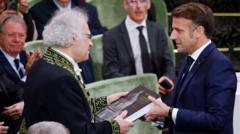In a ceremonial presentation to President Macron, France's Académie Française unveiled the ninth edition of its esteemed dictionary, a project that has spanned forty years and more than four hundred since its inception. Celebrated in the historic Collège des Quatre-Nations, the gathering marked a notable contribution by the Academy’s esteemed 40 immortals, recognized for their literary and linguistic prowess. Their mission was initially to cultivate and preserve the French language, leading to the creation of the first dictionary in 1694; however, the process has proven sluggish over centuries.
Linguists have expressed skepticism, questioning the relevance of such a protracted effort. A collective from the Liberation newspaper remarked, “The effort is praiseworthy, but so excessively tardy that it is perfectly useless,” amidst criticism over the length of time taken to complete dictionary entries. The ninth edition replaces an eighth version published in 1935, with the final entries from R to Z only arriving years later.
While the Academy boasts the dictionary as a reflection of modern times—incorporating 21,000 new terms prevalent from the 1950s to today—a paradox emerges as many terms considered "modern" from the 1980s and 90s quickly become outdated. Notably absent are contemporary terms like tiktokeur, vlog, smartphone, and émoji, which are readily found in commercial dictionaries. Rather, it features more dated additions such as soda, sauna, and yuppie, leaving critics to wonder about its pertinence.
Attempts to address linguistic evolution include the feminization of professional titles, showcasing new female alternatives for roles like “ambassadeur” and “professeur.” However, discrepancies exist in earlier sections where such terminologies do not appear, reflecting the Academy’s past reluctance to adapt to social changes. Furthermore, defining marriage as a union solely between a man and a woman in the dictionary contradicts the evolving societal norms in France.
Amidst the ongoing dialogues led by writer Amin Maalouf, discussions for a tenth edition are already in motion, with a push for a more responsive approach to language. Michael Edwards, an English poet and member of the Academy, has advocated for terms such as “improfond” (undeep), noting the need for a word representing “shallow” in French, though his attempts have thus far proven unsuccessful.
As linguistic landscapes shift rapidly, the Académie Française continues to grapple with balancing tradition and modernity, raising questions on the future relevance of their long-awaited lexicon.
Linguists have expressed skepticism, questioning the relevance of such a protracted effort. A collective from the Liberation newspaper remarked, “The effort is praiseworthy, but so excessively tardy that it is perfectly useless,” amidst criticism over the length of time taken to complete dictionary entries. The ninth edition replaces an eighth version published in 1935, with the final entries from R to Z only arriving years later.
While the Academy boasts the dictionary as a reflection of modern times—incorporating 21,000 new terms prevalent from the 1950s to today—a paradox emerges as many terms considered "modern" from the 1980s and 90s quickly become outdated. Notably absent are contemporary terms like tiktokeur, vlog, smartphone, and émoji, which are readily found in commercial dictionaries. Rather, it features more dated additions such as soda, sauna, and yuppie, leaving critics to wonder about its pertinence.
Attempts to address linguistic evolution include the feminization of professional titles, showcasing new female alternatives for roles like “ambassadeur” and “professeur.” However, discrepancies exist in earlier sections where such terminologies do not appear, reflecting the Academy’s past reluctance to adapt to social changes. Furthermore, defining marriage as a union solely between a man and a woman in the dictionary contradicts the evolving societal norms in France.
Amidst the ongoing dialogues led by writer Amin Maalouf, discussions for a tenth edition are already in motion, with a push for a more responsive approach to language. Michael Edwards, an English poet and member of the Academy, has advocated for terms such as “improfond” (undeep), noting the need for a word representing “shallow” in French, though his attempts have thus far proven unsuccessful.
As linguistic landscapes shift rapidly, the Académie Française continues to grapple with balancing tradition and modernity, raising questions on the future relevance of their long-awaited lexicon.




















